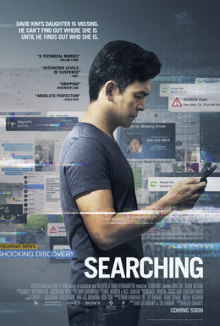
So Searching turns to be just the perfect little American independent film. It’s the feature film debut of its director Aneesh Chaganty, it was made with a super low budget and it makes use of a clever new gimmick to tell its story. John Cho is of course a pretty recognizable Hollywood star these days but this is apparently still the first time an Asian American actor headlines a Hollywood thriller.
David Kim and his daughter Margot’s relationship deteriorates after his wife passes away from cancer. Through instant messages, digital photos, videos and e-mails, the film chronicles their lives. One evening Margot fails to return home, supposedly at a study group. She attempts to call David but he doesn’t pick up the phone as he is asleep. The next morning David at first thinks that she has left for school early despite her not picking up his calls and later believes that she has left for her piano lessons. When he contacts the piano teacher, he learns that she cancelled her lessons six months ago. After using her laptop to log in to her accounts, he finds out that she has been saving the piano lesson fees only to make a large payment several days ago. He officially files a missing persons report to the police and detective Rosemary Vick leads the search. Meanwhile he continues to search for clues through her online presence and discovers that he really knows very little about her as she has almost no real life friends and video chats with online friends instead.
This film’s big gimmick is that all it uses are either in-world cameras or screen captures of computers and phones. It relies heavily on text messages between characters and even when two characters speak, they do so most of the time through video calls. This nicely captures the reality of modern life and it’s surprising how effective a few terse lines and emoticons can be in conveying emotions and the urgency of the situation. I also appreciate that David Kim is portrayed as being a competent professional of the digital age. Even though he isn’t familiar with the websites his daughter uses and doesn’t know her passwords, he is adept at using his physical access to her laptop to reset passwords as needed, look up her browser history, search through her contacts and use various online services to trace her movement. It actually feels quite refreshing how a film finally manages to show someone competent in IT work to solve a mystery without it devolving to ridiculous super-science.
Thematically, the film is on weaker ground as its two arcs are somewhat at odds with one another. The first, and most interesting theme, is David coming to realize how little he knows his own daughter as he explores the clues to her online life. The second is a bona fide investigative mystery as he works to uncover what really happened. This latter part is frustrating as he keeps running into clues that turn out to be red herrings, which sometimes feels like padding the film for length. I especially dislike how in the end, it turns out that he was struggling against a different opponent all along and it was never about knowing his daughter well. The extent to which the film commits to its gimmick also becomes distracting. If it’s necessary to use a more conventional camera for a scene, it would be more natural to do so rather than to find a pretext for an in-world camera.
On the whole I’d say that this is an excellent film albeit one with a number of flaws. It probably overuses text messages, video calls etc., but other films should learn from it to reflect a more up to date view of how social interactions occur. I also love how it uses Windows XP and old versions of the YouTube page to show scenes that are set in the past and how as time passes the software and websites are updated. It’s a strong recommendation, no question.